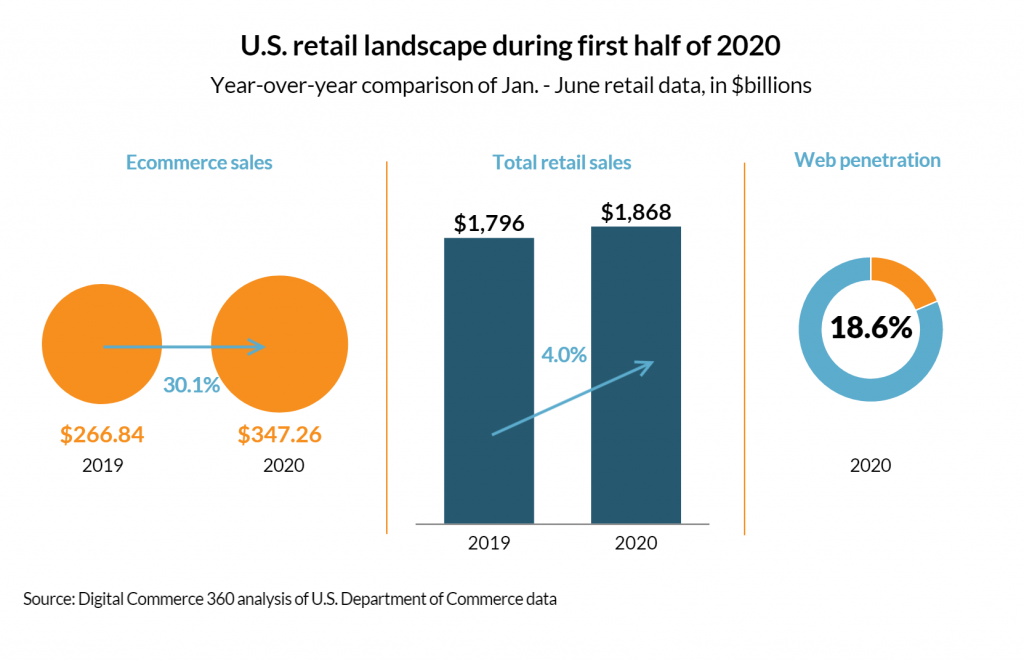
Last updated on
September 2, 2023
In the middle of a pandemic that has infected over 34 million people, the eCommerce industry has witnessed a significant transition. For instance, retailers with no revenue due to the closure of their physical stores have moved online citing a major shift in consumer shopping habits. Amazon - the online retail giant has hired hundreds of thousands of employees to combat the eruption in demand for online shopping and deliveries.

This is just a tip of the iceberg as global eCommerce retail sales are headed towards a soaring $6.54 trillion in revenue in 2022, according to Statista. As the eCommerce industry continues to blossom even during the pandemic, let’s take a look at the 5 most profitable eCommerce businesses to invest in 2020.
From Amazon to eBay, the eCommerce marketplaces witnessed tremendous growth with increased buyers spending in the first six months of 2020. The spike was largely due to altered consumer habits amid coronavirus.

Moreover, despite the ease of restrictions and reopening of many retail stores, consumers are increasingly hesitant to visit a physical store. Online shopping continues to be the preferred option - a trend that is likely to remain even after the pandemic. This gradual shift to online shopping has prompted all retailers to hasten their digital transformation - a process that usually takes years to complete happened in weeks.
Uncertainty around the COVID-19 crisis has changed the way people shop. Below we have listed a few new habits that reflect the changing consumer sentiments.
Due to a shortage or scarcity of products like toilet paper, for instance, at their go-to shops, customers are trying new retailers and online stores. Many consumers confirmed that they were satisfied with the service and would use them again. Loyalty shock has meant that only those retailers who can satisfy or meet most requirements of their consumers during the crisis are likely to lead the post-pandemic retail world.
We are witnessing a new trend where customers are keenly supporting their local communities. According to a recent survey by Zypmedia, nearly 84% of all consumers are likely to buy from a local business because they want to support their community.

Amid concerns around the infections, customers across all age groups have shifted to online channels. This trend is likely to persist as omnichannel and online purchasing becomes the new normal.
Fashion, electronics, furniture - niche marketplaces in all retail spectrums have emerged stronger during the pandemic. From entrepreneurs investing in a new marketplace to retail giants like Walmart expanding to more small businesses, the eCommerce marketplace has become a go-to business for many. The sheer volume of sales and revenue registered by online retailers during the COVID19 crisis was unheard of before. And, as most retailers are forced to shift their stores online, this is just the time to launch a new multi-vendor marketplace. Start your journey with the ready-to-launch eCommerce marketplace platforms to maximize your business potential.
Online learning with global tech investments was already a booming market projected to reach $350 billion by 2025 before the pandemic accelerated its growth even further. As traditional learning methods stood disrupted, online learning became the only viable alternative to continue teachings.

There were several developments in the eLearning sector by various tech giants and leading organizations during the crisis. For instance, the World Bank started working actively with education ministries in several countries to utilize educational technologies and provide students access to remote learning opportunities during the pandemic. Also, BYJU’s - the world’s leading edtech company started offering free live classes on its Think and Learn app which helped them register a 200% increase in new students.
Remote learning is now among the most profitable business ideas for entrepreneurs and enterprises. It allows teachers in a remote location to teach students (at another location) without attracting any undue risk of contracting the virus. This is why eLearning platforms have seen tremendous growth this year. From LessonFace to Busuu, almost every major eLearning marketplace is witnessing huge demand. Similarly, Music To Your Home, an online marketplace for private music lessons registered a 20% increase in service from last year. According to a recent survey by Statista, the e-learning market revenue in Latin America alone is expected to reach $2.67 billion in 2020 and surpass $3 billion by 2023.
Many important factors are influencing the eLearning market size, such as:
Moreover, individuals with teaching experience or expertise in a particular sector but without jobs are hurling towards online platforms for sustained income. The potential growth opportunities today in the niche industry are second to none. This is one of the primary reasons why starting an online e-learning marketplace and developing useful tools for remote teachers, like test grade calculators is a profitable business idea especially with the availability of ready-to-launch online learning platforms.
Another industry with insurmountable growth opportunities, the food delivery business has only blossomed amid the pandemic. According to Statista, 41.7% of US consumers surveyed in March 2020 responded that they were more likely to order food online if confined to their homes.

Fast-forward to August 2020, a few studies reveal new trends that highlight how the pandemic has impacted the delivery business. Let’s check out these trends:
Citing the recent food ordering trend, a large number of restaurants nearly 42% added food delivery to their service while 31% continued to invest in their existing delivery service. For many restaurants with closed dine-in service, food delivery was the sole revenue source amid lockdowns. And now, while the restrictions are being lifted and dine-in services are allowed, people are still hesitant to visit a restaurant. They are more than happy to order from their favorite restaurant online since it is considered to be a safe and convenient option.
The on-demand food delivery platforms have prospered with notably bigger average size orders in the second quarter. For instance, the average order size on Grubhub was $39, registering a 20% increase from last year. Similarly, DoorDash, UberEats, and all other popular food delivery services also registered a significant increase in orders. While families confined to their homes was considered the primary reason for bigger orders, higher pricing, and ordering from different restaurants were other potential factors.
To fulfill the increasing demand for food delivery while practicing social distancing measures, every major food delivery company introduced contactless delivery. Combined with online payment, the contactless delivery option quickly became a popular choice of ordering food online. It kept both the consumer and driver safe while ensuring that the rising demand for food is met.
Apart from these emerging new trends, there were a few key acquisitions that hinted towards the changing food ordering and delivery landscape. For instance, recently this year in June the European food delivery service Just Eat Takeaway.com acquired Grubhub for a whopping $7.3 billion to enter the US market. And just a month later in July, Uber - the other top food delivery giant acquired Postmates for a $2.56 billion all-stock deal. Both deals had a huge impact and quickly highlighted the true potential of a highly competitive yet profitable market. This signifies why food delivery is one of the top five eCommerce businesses to invest in.
Supply chain disruptions due to COVID19 have caused a sudden shift in consumer’s grocery shopping behavior. More people are using services like Instacart and Amazon Fresh to order fresh groceries online. And, just like food delivery, the average grocery bill has also increased as families are confined to their homes.
From stockpiling essential items to online grocery shopping, consumer habits have certainly changed in the last six months since the COVID19 outbreak. According to a recent survey in late July on 501 US adults by The Manifest (a business news website), nearly 38% of people say that their grocery bill increased during the pandemic.

Another survey by Inmar Intelligence on 300 US consumers found that nearly 80% of consumers shopped for groceries online since the pandemic. For them, convenience and availability were the two standout factors when looking for an eCommerce option. This means that all retailers and brands that deliver meaningful experiences and retain their customers are more likely to lead the post-pandemic retail world.
Online grocery sales have grown within a few months in 2020 exceeding all growth channels. With digital transformation a necessity for all grocery retailers, eCommerce sales are likely to contribute more in the coming months.

Amid the increasing demand for online grocery shopping, many popular retailers registered unprecedented growth. For instance, Ocado - UK’s top online supermarket registered a 27% increase in retail revenue as profits doubled. Within an hour into the lockdown announcement by UK’s PM Boris Johnson, Ocado’s website registered nearly as many shoppers as they did in the entire first quarter. Also, Kroger - America’s largest supermarket recorded a 92% growth in the first quarter largely due to the surge in online grocery shopping.
While these brands are elite in the list, they still couldn’t meet the soaring demand of all consumers. According to The Guardian, Ocado has as many as 1 million consumers still on the waiting list wanting to sign up for the online grocery service. This showcases the great potential in the online grocery market and why it is among the most profitable eCommerce business ideas this year.
Full of possibilities and potential growth opportunities, the online rental market is vast with many sectors still unexplored. From clothing rentals to furniture rentals, the niche industry is blessed with many existing and new sectors contributing to the overall growth of the online rental market. As people are confined to their homes, we are witnessing an increase in rental market revenues this year.

While popular rental marketplaces like Airbnb, Uber, or RentTheRunway have all been impacted by the pandemic, the future looks bright especially with the ease of lockdown restrictions worldwide. Airbnb, for instance, with a rather subdued 2020 is poised for a comeback as apartment bookings start to grow again. Their growth is contributed by the local travel boom as people are opting for vacations at nearby rental locations. Similarly, Uber is also registering an increase in ride requests but the recovery is fueled mostly by people going out during party hours. Since pubs and bars were shut during the pandemic, people booked uber to visit a friend’s house and refresh themselves.
Meanwhile, there are many prospering online rental markets forecasted for growth. The global online clothing rental market, for instance, is one such thriving marketplace. With an evaluation of $1.26 billion in 2019, it is expected to almost double by 2025 with a compound annual growth rate (CAGR) of 8.7%. Similarly, the online vehicle rental marketplace is another popular niche market forecasted for greater revenue and growth over the next few years.
Despite the crisis making global transitions, the rental marketplaces have quickly adapted to the new normal. And soon we’ll see a bigger transition as new entrants emerge in rental sectors still unexplored. With ready-to-launch marketplace solutions and the enormous potential in-store, this is a definite possibility today. And if you’re an entrepreneur or a business, it is the best time to kickstart your rental marketplace and reap the benefits.
<br>
<div style="display: flex; justify-content: center">
<a class="blog-cta"href="https://app.mailmunch.com/users/sign_up" target="_blank" style="color:#FFFFFF; font-family:Arial, sans-serif; font-size:16px; font-weight:400; background-color:#0157FF; padding:15px 30px; text-decoration:none; border-radius:6px; margin-top:10px;text-align:center">Start exploring now!</a>
</div>
E-Commerce businesses in all categories have been steadily progressing over the years. The pandemic has merely accelerated the shift to digital transformation for retailers and businesses. Digital commerce is no more an option but a necessity for all retailers to survive amid the crisis. As existing online retailers get overwhelmed with the unprecedented demand, it is the best time to invest in an eCommerce business idea. Choose ready-to-launch marketplace solutions for rapid digital transformation and growth.
Ankush works as a Marketing Manager at FATbit Technologies. FATbit is a renowned software development and turnkey eCommerce solutions company. Ankush expertise lies in branding and formulating eCommerce marketing strategies for startups and brands. He has been active in online marketing services for the past 8+ years.
Tags:

Hamna Abid
July 11, 2023

Hamna Abid
June 23, 2023

Ammar Mazhar
May 30, 2023